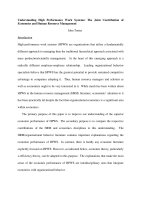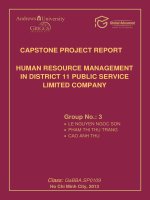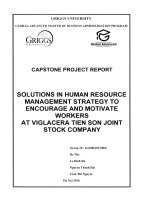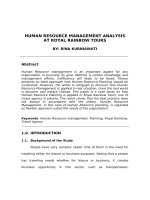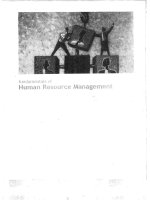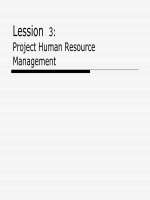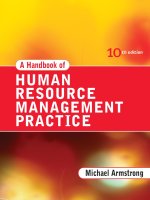Human Resource Management - The Case of the X Footwear Company
Bạn đang xem bản rút gọn của tài liệu. Xem và tải ngay bản đầy đủ của tài liệu tại đây (504.83 KB, 11 trang )
Header Page 1 of 27.
VNU Journal of Science, Economics and Business 28, No. 5E (2012) 17-27
Human Resource Management
The Case of the X Footwear Company
Nguyễn Ngọc Thắng*
Faculty of Business Administration, VNU University of Economics and Business,
Cầu Giấy, Hanoi, Vietnam
Received 13 August 2012
*
Abstract. The leather and footwear industry in Vietnam is currently faced with a shortage of
human resources (HR). Therefore, HR competition inside the industry is vigorous. The most
important task of managers is how to appeal to talented, skilled workers and limit the number of
skilled workers leaving companies to work for competitors. In order to appeal to and maintain
talented people, companies should pay more attention to reward policies as well as motivation
policies for them. This research focuses on the case study at the X Footwear Company, based on
studying the human resource management (HRM) of the company. A questionnaire was designed
to collect data related to HRM from employees. More specifically, the questionnaires concentrated
on: (1) performance appraisal, (2) wages and rewarding, (3) the working environment, and (4)
training. Results from 350 responses provide a detailed picture about HRM at the X Footwear
Company. We also draw some implications for management, limitations of this study and
recommendations for research about this topic in the future.
Keywords: Human resource management (HRM), firm performance, X Footwear Company.
1. Introduction*
Southeast Asia. Vietnam has also attracted
significant inflows of foreign direct investment
(FDI). FDI has not only generated profits for
foreign investors, but has also represented an
important capital source, bringing in technology
transfer and advanced managerial skills (Quang
and Van der Heijden, 2009; Thang et al., 2010).
More specifically, the world leather and
footwear industry continues the trend of
moving manufacturing to developing countries,
especially nations that have a favourable
investment environment and stable politics like
Vietnam (CIEM, 2006). This creates several
opportunities for Vietnamese companies.
The Doi moi (renovation) policy has opened
up new opportunities for Vietnam to make full
use of its inherent comparative advantages,
notably relatively untapped natural resources
and an abundant and low-cost workforce. These
advantages are being exploited to increase
Vietnam’s exports, which helps generate an
increasing flow of foreign income for economic
growth and industrialization, and has made it
become the fastest growing economy in
______
*
Dr., Tel.: 84-946611417
E-mail:
Footer Page 1 of 27.
17
Header Page 2 of 27.
18
/ VNU Journal of Science, Economics and Business 28, No. 5E (2012) 17-27
However, they also are faced with more
concentrated competition from overseas.
Therefore, how can companies survive,
especially while operating in an industry with
many competitors? How can the companies
utilize HR to encourage business activities and
improve employees’ incomes? How can local
domestic enterprises adopt some of the HR
practices - emphasizing training and incentive
compensation rather than the base wage?
This study attempts to answer the above
questions by using a case study approach (Yin,
2003) to analyse the HRM activities at X Footwear
Company. The case study is a suitable research
strategy when it is necessary to study the
phenomenon empirically in its context. The
advantage of the case study method is accurate
control for all other factors that may influence
HRM and a lack of insufficient data. The empirical
evidence was collected by personal observation
through a desk study, on-site visits, and a survey
questionnaire in the X Footwear Company.
2. Theoretical Framework
In a rapidly changing and competitive
environment, HRM is seen as a strategic factor
in influencing not only the success of
organizations but also that of nations. HRM has
g
assumed considerable importance in both the
theory and practice of management of
organizations. The developments are not
confined to any particular country, being found
internationally in both developed and
developing countries. That is not to say that
there is a universal model of HRM applicable to
all countries. With that caveat in mind, let us
briefly review the various theoretical
approaches to HRM.
Fombrun and his colleagues (1984) at
Michigan Business School launched a model,
which
emphasized
that
organizational
effectiveness depends on achieving a tight fit
between HR strategy and the business strategy
of the firm. In short, strategic HRM should be
seen as the overlapping part of both strategic
and general management on the one hand, and
personnel management on the other. The
selection system ensures the deployment of
individuals with the appropriate aptitudes,
knowledge and experience. The appraisal
system enables the firm on a regular basis to
assess whether performance is satisfactory. The
reward system distinguishes between different
levels of performance. Finally, the development
system should be available in those instances
where the appraisal system indicates
performance shortcomings (Figure 1).
Figure 1: The Michigan model of HRM
Source: Fombrun, Tichy, and Devanna (1984).
Footer Page 2 of 27.
Header Page 3 of 27.
/ VNU Journal of Science, Economics and Business 28, No. 5E (2012) 17-27
In its transition economy, Vietnam, has old
technology and unstable economic conditions.
However, the Government has put HR as a
priority during the national development
progress. In such an economy, HRM is a
composition of theories, policies and functional
supporting HR, training and developing as well
as retaining employees in an organization to
achieve the optimal results for both the
organization and employees. More specifically,
HRM activities encourage employees to
contribute effectively to the objectives of the
organization and help them to achieve
individual objectives. Adopting the HRM
model of Fombrun et al. (1984) and applying it
to Vietnam, researchers have developed an
HRM
- Recruitment
- Training and development
- Performance appraisal
- Benefits and compensations
- Working environment
19
HRM model for the Vietnamese context (Dung,
2001; Gary Dessler, 2003; Diem and Quan,
2007; Thang and Quang, 2011).
To contribute to the theoretical literature, a
theoretical framework was developed and
proposed to fulfil the requirements for
analysing HRM and firm performance issues,
shown in Figure 2. This figure, is based on the
fundamental premises of HRM activities and
firm performance. HRM activities are
predicated on contributing to higher-level group
and organization objectives, results, and
performance. A number of HRM activities are
included
recruitment,
training
and
development, performance appraisal, benefit
and compensation, and working environment.
Firm performance
- Financial performance (ROI, ROA,
ROE, ROS, Sales, Productivity, etc.)
- Non-Financial performance
(Labor Turnover, Absence, Conflict,
Quality, etc.)
Figure 2: A framework to analyse HRM activities
Source: Thang, Quang, and Buyens (2010).
3. Methodology
The main research methodology to be
applied in this research is qualitative.
Information and data related to HRM of the X
Footwear Company was collected via:
A Desk study: A literature review of
relevant documents and materials on theories of
HRM was conducted. Study of the selected case
organization’s reports, data and background
description will also be accomplished to
provide an inclusive picture and a profound
analysis for report writing.
On-site visits: The empirical evidence was
collected by personal observation through on-site
visits and interviews with the executives and
functional managers of the X Footwear Company.
Survey questionnaire: The questionnaire was
designed to collect data related to HRM from the
Footer Page 3 of 27.
X Footwear Company employees. More
specifically, the questionnaires concentrated on:
(1) performance appraisal, (2) wages and
rewarding, (3) the working environment, and (4)
training and development. More detail about the
questionnaires are in the appendix. The survey via
questionnaires was delivered to all employees and
there were 350 responses. For data entry and
analysis SPSS software was used.
4. Results and Discussions
Recruitment
Through on-site visits, we found that job
rotation and personnel transfer was taking place
effectively, ensuring there were sufficient
number of employees in departments and
workshops and at busy events such as trade
Header Page 4 of 27.
20
/ VNU Journal of Science, Economics and Business 28, No. 5E (2012) 17-27
fairs and ceremonies. The company cooperates
with other organizations to recruit labour
including the Job Centre of Vinh Phuc
Province, in collaboration with the College of
Industry No. 3 and the College of Irrigation.
However, recruitment still needs improving in
some aspects, as follows:
The administration function and HRM
function are combined in one division and that
leads to one person being responsible for joint
tasks. This person is responsible for
administrative issues and is also in charge of
wages and rewarding for employees. The
recruitment group is not in charge of HR
planning, therefore, they cannot be active in
recruitment. The recruitment group is currently
overloaded due to the large number of labour
requests with urgent needs, but the company does
not have enough staff to serve this function.
The company website is designed with a
Recruitment tab. However, it is not very
effective due to a lack of attention. If you click
on the tab, you can see only one form of
information to fill in to send to the HR
department. There is no information on vacant
positions or task information.
The cooperation between the administration
department, the HR department and other
departments, business units, factories is not
coordinated,
especially in interviewing
technician candidates. The interviews are
conducted without the participation of a
technical department representative. In addition,
HR planning is just simply proposing the
number of employees for recruitment to each
department in a year.
Performance appraisal
The result of the survey showed 59 responses
(approximately 16.85%) said the performance
appraisal is fair and accurate. Fifty-seven responses
(approximately 16.28%) believe the upper level
managers are not capable to provide an accurate
performance appraisal. Two hundred and fifty
responses (approximately 71.42%) saw the benefits
of performance appraisal as supporting them with a
clear working plan and personal training and
development. Only 62 responses (approximately
17.71%) saw no improvement from performance
appraisal. Eighty-one responses (approximately
23.14%) said the current performance appraisal
method is not suitable. More detail about the results
are in Table 1.
Table 1: Performance appraisal
Number of responses (350 employees)
Statements
Performance appraisal is fair and
accurate
You believe that your manager has
sufficient ability to evaluate your
performance
Performance appraisal process helps
you to have a clear plan on training
and career development
Performance appraisal is useful to
improve quality of performance
The current performance appraisal
method is suitable
Footer Page 4 of 27.
1
8
2.29%
2
12
3.43%
3
39
11.14%
4
54
15.43%
5
82
23.43%
6
77
22%
7
78
22.29%
15
4.29%
16
4.57%
26
7.43%
62
17.71%
98
28%
71
20.29%
62
17.71%
11
12
22
55
71
84
95
3.14%
3.43%
6.29%
15.71%
20.29%
24%
27.14%
25
7.14%
7
2%
30
8.57%
67
19.14%
91
26%
72
20.57%
58
16.57%
33
9.43%
18
5.14%
30
8.57%
78
22.29%
81
23.14%
52
14.86%
58
16.57%
Source: Author survey 2012.
Header Page 5 of 27.
/ VNU Journal of Science, Economics and Business 28, No. 5E (2012) 17-27
In general, employees were satisfied with
performance appraisal. However, the limitation
here is that the company does not have an
official performance appraisal. When the
company expands, the number of employees
will increase sharply and the labour force
become more diversified. The performance
appraisal will need to be improved to encourage
a promotion attitude among employees.
Talented people will expect to receive concrete
performance appraisals in accordance with
suitable rewards. The competition will be more
vigorous if manager evaluation is just general.
The manager evaluation will not answer
employees’ expectation. This is a matter that
21
needs more attention from the management
board of the company.
Benefits and compensations
The survey results showed that 245 responses
(approximately 70%) said they did not receive
high wages. Two hundred and thirty-one
responses (approximately 66%) said their salary
had not increased. Two hundred and twelve
responses (approximately 60.57%) said they
could not rely on income received from the
company to maintain their standard of living.
Only 93 responses (approximately 26.57%)
thought the salary equal to their contribution. One
hundred and twenty-six responses (approximately
36%) think their salary and wages are fair. More
detail about results are in Table 2.
Table 2: Benefits and compensations
Statements
You receive high salary
Your salary is increased
periodically
You can maintain your living
standards with income
received from company
Wages are equal to your
contribution
Wages, income paid fairly
1
115
32.85%
Number of responses (350 employees)
2
3
4
5
62
68
52
30
17.71% 19.42% 14.85%
8.57%
122
34.86%
103
29.43%
55
15.71%
56
16%
54
15.43%
53
15.14%
67
19.14%
55
15.71%
67
19.14%
38
10.86%
65
18.57%
58
16.57%
27
7.71%
56
16%
6
14
4%
7
9
2.57%
36
10.29%
37
10.57%
8
2.29%
23
6.57%
8
2.29%
23
6.57%
87
24.86%
59
16.86%
21
6%
13
3.71%
83
23.71%
64
18.29%
35
10%
27
7.71%
Source: Author survey 2012.
Table 2 shows that the salary system of the
Company is not motivated to the needs of the
employees. Most employees are not satisfied
with their salary. Employees say they could not
maintain a reasonable standard of living with
the income they get from their work and so they
do not contribute passionately to the company.
Many of them see the salary as not equal to
their contribution. Therefore, they are depressed
and may leave the work at any time to join any
company that can pay them more highly.
Footer Page 5 of 27.
Working environment
The survey results show that 137 responses
(approximately 39.14%) said the work is high
pressure.
Eighty-seven
responses
(approximately 24.85%) said they are requested
to work overtime frequently. Two hundred and
ninety responses (approximately 82.85%) said
equipment at the working stations is clean. Two
hundred
and
seventy-one
responses
(approximately 77.42%) said their job is secure
and they are not worried about losing their job.
More details about the results are in Table 3.
Header Page 6 of 27.
22
/ VNU Journal of Science, Economics and Business 28, No. 5E (2012) 17-27
Based on the above figures, we can see that the
working environment is quite good. Most of the
employees are satisfied with the working
environment and feel safe to work there.
Table 3: Working environment
Statements
The work is conducted
without high pressure
Your work does not require
you to work overtime
Equipment at the work place
is clean and safe
Security of work is good, no
worries of losing job
1
52
14.86%
28
8%
7
2%
12
3.43%
Number of responses (350 employees)
2
3
4
5
6
38
47
67
68
41
10.86% 13.43% 19.14% 19.43%
11.71%
19
40
38
72
73
5.43% 11.43% 10.86% 20.57%
20.86%
9
17
27
71
84
2.57%
4.86%
7.71%
20.295
24%
7
13
47
59
85
2%
3.71% 13.43%
16.865
24.29%
7
37
10.57%
80
22.86%
135
38.57%
127
36.29%
Source: Author survey 2012.
Training and development
The survey results show that 20 responses
(approximately 5.71%) said they were not
provided with enough knowledge and skills to
work. Only 12 responses (approximately
3.42%) said they participated in training
programs that provided them with sufficient
working
skills.
Fourteen
responses
(approximately 4%) said the company does not
conduct an annual training needs identification
survey. Only 14 responses (approximately
4.0%) agreed that the company does not have
policies supporting employees in training. Two
hundred and seventy-three responses agreed
that the company conducts post-training
evaluations. Two hundred and sixty-nine
responses (approximately 76.85%) said that the
company is doing training effectively. More
detail about the results are in Table 4. These
numbers show most employees are pleased with
the training policy of the company. We can see
that the training policy of the company is quite
effective, creating favourable conditions for
employees to develop and improve.
Table 4: Training and development
Number of responses (350 employees)
Statements
1
1
0.29%
2
4
1.14%
3
15
4.29%
4
42
12%
5
72
20.57%
6
91
26%
7
125
35.71%
2
0.57%
4
1.14%
6
1.71%
35
10%
88
25.14%
96
27.43
119
34%
0
0%
4
1.14%
10
2.86%
44
12.57%
79
22.57%
94
26.86%
119
34%
The company conducts posttraining evaluations
4
1.14%
5
1.43%
22
6.29%
46
13.14%
90
25.71%
70
20%
113
32.29%
In general, training is effective
3
0.86%
7
2%
23
6.57%
48
13.71%
86
24.57%
81
23.14%
102
29.14%
You have been provided
sufficient knowledge and
skills to work
The company conducts a
training needs identification
survey annually
The company has a policy
which supports training for
employees
Source: Author survey 2012.
Footer Page 6 of 27.
Header Page 7 of 27.
/ VNU Journal of Science, Economics and Business 28, No. 5E (2012) 17-27
However, the training department has not
conducted a job analysis and training need
identification survey. Training evaluation also
needs improving. In addition, the company has
not implemented career orientation and career
development programs for employees. On the
other hand, the leaders of company are all very
experienced, but they have not shared their
experience in internal training programs.
Recommendations and Suggestions for the
X Footwear Company
Recruitment
Complete a job description for each
position: In order to recruit qualified staff, the
company needs to not only conduct HR
planning effectively to establish a long-term
HR policy and an annual recruitment plan, but
also needs to prepare job descriptions for the
different positions. A job description helps
clarify duties and the tasks of positions and
departments and to avoid overlaps. This is one of
the most important factors to improve
management capability and to ensure fairness and
transparency in performance appraisal and
staffing. With the above-mentioned benefits, job
descriptions are of the certain request during the
development progress of the company.
Rational staffing: Every department should
be consistent in staffing, assigning the right
person to the right place whether they are
newcomers or current employees. Heads of
divisions or departments should be the person
in charge of staffing. In order to conduct the
assignment properly, the company should pay
attention to the following: list all functions and
major duties of the department, based on the
company regulations/policies; list all functions/
duties that are currently conducted by the
department; and compare the practical list of
duties to the ones in the policies of the company
to realize additional duties, and to adjust
policies to avoid overlaps.
Performance appraisal
Apply a 360 degree method to assess the
capabilities and performance of employees: In
order to maintain a quality HR, it is required
Footer Page 7 of 27.
23
that the company not only pays attention to
wages and welfare but also develops a suitable
performance appraisal system. Appropriate
performance appraisal will create positive
competition among employees. Currently,
many companies use terminology such as:
“staff evaluation” and conduct “staff evaluation
process”. Therefore, some managers consider
staff as the target of evaluation, and then they
evaluate the staff member individually
(personal
characteristics,
habits,
communication, relationships and so on)
instead of evaluating the contribution of
employees to the company. When we use the
term “performance appraisal” we mean the
managers will assess what their staff have done
to contribute to the objectives of the company
and the company should pay them based on
their capabilities.
IT application: Information technology in
companies is increasing and leads to changes in
every aspect of a company’s operation. IT helps
a company operate more accurately,
scientifically and effectively. The company
should apply IT into HRM as per the following
recommendations:
- Employee management: store and update
all information relating to employees from
recruitment until they leave the company.
- A Finger print enrolment system will store
information on the working time of employees
while travelling between office, shops, and
workshops and so on. The system could help
the company manage the working time of
employees and support managers in a
performance appraisal at the end of each month.
- A Reminder application: This application
manages the amount of work of each
individual. Tasks include assigned tasks and
individual tasks. All tasks are tagged with an
appropriate status: incomplete, be prepared to
complete, in progress, rate of completion,
deadline and so on.
Benefit and compensation
Wages are a common concern in the
company. The average salary of workers is
Header Page 8 of 27.
24
/ VNU Journal of Science, Economics and Business 28, No. 5E (2012) 17-27
quite low and not equal to their contribution (X
Footwear Company, 2010). This is considered as
the main reason that many skilled workers have
left their job. The change in wage structure is a
critical matter for the company so the company
needs to establish a project team to conduct this
field of work. Based on the organizational
structure of the company, the author proposes the
following solutions to wage structure:
- Develop an internal staff level system.
- Consider and analyse the current wages
paid by the company and compare them to
others in the market.
- Design and propose a new wage structure
that is fair and competitive.
- Undertake preliminary consulting on
effective salary calculations for employees.
Working environment
Motivate employees and take care of their
health, safety and life: The company should
cooperate with the Trade Union to develop a
corporate culture where all members are working
and helping each other and are being encouraged
to improve their knowledge, education level,
professional level and managerial skills through
internal and outsourced courses so that company
becomes a second home of the workers especially skilled workers and experienced
managers - thereby increasing their commitment
to the company. The company should organize
parties, group tours, and team building activities
more frequently to recognize the contributions of
employees to the company. Currently, the
company is doing these activities quite well.
However, it needs to be more creative in order to
encourage the participation of all employees.
Therefore, event organizers must be very creative
with new ideas to encourage other members.
Training and development
Training need identification: The training
needs are all the needs that can be fulfilled by
imparting training to the participants in a
program and that training thereby will improve
the productivity of the participants and meet the
company
objectives.
Training
needs
identification includes the following activities:
Footer Page 8 of 27.
developing tools for collecting data on training
needs (individual questionnaires, group
questionnaires,
managerial
level
questionnaires). The training department should
develop
training demand
identification
planning, collect information on training needs,
and analyse training needs information that has
been gathered.
Conduct training evaluations: It is
necessary to evaluate training programs and
training activities so that there can be an
adjustment in time and an improvement in
training quality and training effectiveness
through the following methods: multiple
choice, evaluation and conclusions of
experience with participants evaluating the
program. With the mode of participants
evaluating programs, the evaluation would be
made in the middle and at the end of the
training course. Outsourced training centres
would provide the company with an evaluation
summary for each course and for the whole
program. The training department of the
company would complete a training report
which would be submitted to upper level
managers.
3. Conclusion
The Michigan model is known as the
“matching model” or “best-fit’” approach to
HRM. In essence, it requires that HR strategies
have a tight fit to the overall strategies of the
business. The model identifies five common
HR processes performed in every organization.
These include recruitment, performance,
appraisal, rewards, and development. However,
in reality, strategies are often determined and
operationalized on a more intuitive, political
and subjective level. Certainly, the decisionmaking is more complex than the model allows.
Therefore, we added the working environment
factor in HRM. More specifically, the X
Footwear Company needs to considers
selection, better rewards, planning and appraisal
as leading to effectiveness. Senior management
Header Page 9 of 27.
/ VNU Journal of Science, Economics and Business 28, No. 5E (2012) 17-27
can only be effective if there is strategic
integration,
functional
flexibility,
communication, an adaptable organisational
structure, and high commitment and capacity to
manage innovation of the company.
Foreign investment has created the
opportunity for local domestic enterprises to
adopt some of the HR practices, emphasizing
training (CIEM, 1992) and incentive
compensation rather than the base wage
(Hoang, 1995). HRM improvements at X
Footwear Company could be very meaningful
because they could create benefits for not only
the company in particular but also for the whole
footwear and leather industry of Vietnam in
general. Corporate governance has followed the
25
management style of state-owned companies
for a long time. The system has its strengths but
also present serious problems that need to be
fixed in the coming time to support the
development directions of the company.
This paper proposes some recommendations
and suggestions for the company in order to
improve HRM activities in the future. However,
the recommendations and suggestions will not
be effective and efficient without commitment
from the management level as well as a change
in thinking of the top management. Future
research is needed to estimate the impact of HR
activities
(i.e.,
training,
benefit
and
compensation) on firm performance at the X
Footwear Company.
Appendix:
Questionnaire on Human Resource Management
In order to support management board to develop suitable HR policy as well as increase
satisfaction level of employees towards the company, kindly spend your time to complete this
questionnaire. All answers are considered as valuable without being true or false. All information and
answers will be kept as confidential.
Kindly indicate your agreement with following statements. Mark X from 1 to 7 for each below
statement (1 = “strongly disagree” to 7 = “Absolutely agree”):
1. Performance appraisal
Code
app 1
app 2
app 3
app 4
app 5
Statements
Performance appraisal is fair and accurate
You believe that your manager has sufficient ability to evaluate
your performance
Performance appraisal process helps you to have clearer plan
on training and career development
Performance appraisal is useful to improve quality of
performance
Do you think current performance appraisal method is suitable?
Agreement level
3
4
5
6
1
2
7
1
2
3
4
5
6
7
1
2
3
4
5
6
7
1
2
3
4
5
6
7
1
2
3
4
5
6
7
2. Benefits and compensation
Code
ben 1
Statements
You receive a high salary
ben 2
Your salary is increased periodically
You can maintain your living standards with income
ben 3
received from company
Footer Page 9 of 27.
1
Agreement level
2
3
4
5
6
7
1
2
3
4
5
6
7
1
2
3
4
5
6
7
Header Page 10 of 27.
/ VNU Journal of Science, Economics and Business 28, No. 5E (2012) 17-27
26
ben 4
Wages are equal to your contribution
1
2
3
4
5
6
7
ben 5
Wages, income are paid fairly
1
2
3
4
5
6
7
3. Working environment
Code
Statements
Agreement level
env 1
The work is conducted without high pressure
1
2
3
4
5
6
7
env 2
Your work does not require you to work overtime
1
2
3
4
5
6
7
env 3
Equipment in the work place is clean and safe
1
2
3
4
5
6
7
env 4
Security of work is good, no worries of losing job
1
2
3
4
5
6
7
4. Training and development
Code
tra 1
Statements
You have been provided sufficient knowledge and skills to work
1
2
Agreement level
3
4
5
6
tra 2
You have attended training programs fitting with job requirements
1
2
3
4
5
6
7
tra 3
The company conducts training needs identification annually
1
2
3
4
5
6
7
tra 4
The company has policy which support training for employees
1
2
3
4
5
6
7
tra 5
tra 6
The company conducts post-training evaluation
In general, training is effective
1
1
2
2
3
3
4
4
5
5
6
6
7
7
7
hk
References
[1] CIEM (1992), “The small business in Hanoi:
Environment, issues, and perspective”. Research Project
Funded by UNDP, the Ministry of Planning and
Investment, Hanoi.
[2] CIEM (2006), Viet am’s Eco om i 2005, Statistics
Publishing House, Hanoi.
[3] Fombrun, C., Tichy, N. M., and Devanna, M. A. (Eds.)
(1984), Strategic human resource management, New
York: Wiley.
[4] Gary Dessler (2003), Human Resource Management,
9th edition, Pearson Education, Inc.
[7] Phuc Yen Footwear (2010), “Wage policy of X
Footwear Company”, Finance statement of X Footwear
Company.
[8] Quang, T and B. Van der Heijden (2009), “The
Changing Face of Human Resource Management in
Vietnam” in The Changing Face of Vietnamese
Management, Quang Truong and C. Rowley (eds.),
London: Routledge, pp. 24-45.
[9] Thang, N. N., Quang, T and Buyens, D. (2010), “The
Relationship between Training and Firm Performance:
A Literature Review”, Research and Practice in Human
Resource Management, 18(1): 28-45.
[5] Hoang, V. (1995), “Compensation in private
enterprises”, Working paper, National Economics
University, Hanoi.
[10] Thang, N. N. and Quang, T. (2011), “The impact of
training on firm performance in a transitional economy:
Evidence from Vietnam”, Research and Practices
Human Resource Management, 19(1), 11-24.
[6] Nguyen Van Dien and Nguyen Ngoc Quan (2007),
Human Resource Management, Textbook, National
Economics University.
[11] Tran Kim Dung (2006), Human
Management, Statistics Publisher, Hanoi.
Footer Page 10 of 27.
Resource
Header Page 11 of 27.
/ VNU Journal of Science, Economics and Business 28, No. 5E (2012) 17-27
16
Quản lý nguồn nhân lực
Nghiên cứu trường hợp Công ty Giày X
Nguyễn Ngọc Thắng
oa
t
i
Đại học Quốc gia Hà Nội
oa
ờ g Đại học Kinh tế,
y, Cầu Giấ Hà Nội, Việt Nam
Tóm tắt. Ngành công nghiệp giày da Việt Nam đang đối mặt với tình trạng thiếu hụt nguồn nhân lực. Vì vậy, các công ty trong
ngành công nghiệp này đang cạnh tranh mạnh mẽ về nhân lực. Một trong những nhiệm vụ quan trọng của các chủ doanh nghiệp là
làm thế nào thu hút được công nhân có kỹ năng và hạn chế tình trạng họ chuyển sang các công ty đối thủ cạnh tranh. Để giữ và duy
trì công nhân có kỹ năng, các công ty cần chú ý đến các chính sách thưởng cũng như tạo động lực cho người lao động. Nghiên cứu
này tập trung vào hoạt động quản lý nguồn nhân lực tại Công ty Giày X. Một bộ câu hỏi đã được nhóm nghiên cứu thiết kế nhằm
thu thập thông tin liên quan đến hoạt động quản lý nguồn nhân lực từ nhân viên. Cụ thể, bộ câu hỏi này tập trung vào các khía cạnh
sau: (1) đánh giá năng lực, (2) lương và thưởng, (3) môi trường làm việc, và (4) hoạt động đào tạo cho nhân viên. Kết quả thu được
từ 350 bộ câu hỏi phản hồi đã cung cấp một bức tranh tổng thể về hoạt động quản lý nguồn nhân lực tại Công ty này. Chúng tôi
cũng đưa ra các gợi ý cho hoạt động quản lý, các hạn chế của nghiên cứu này và những đề xuất cho các nghiên cứu tiếp theo trong
tương lai.
Footer Page 11 of 27.


